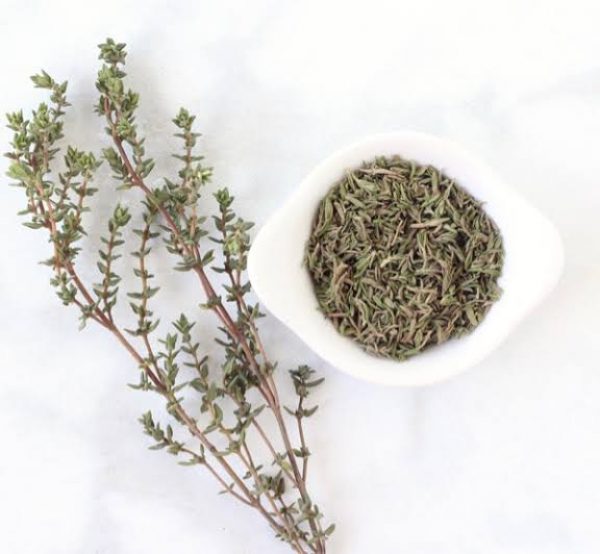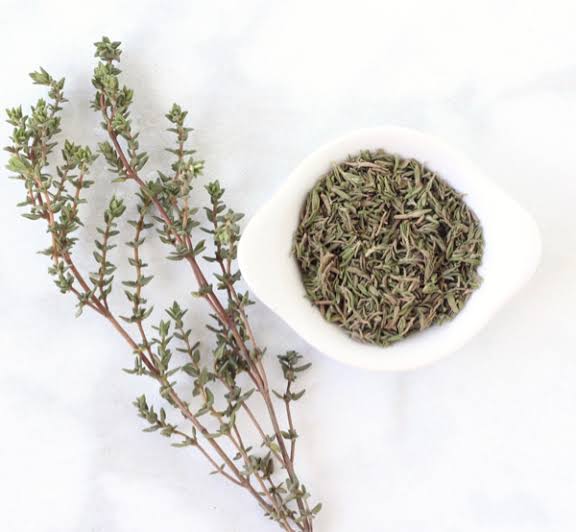[responsivevoice_button voice=”US English Male” buttontext=”listen”]
12 BENEFITS OF THYME:
Thyme’s benefits include:
•Fighting Acne
•Lowering blood pressure
•Helping to alleviate cough
•Boosting immunity
•Disinfecting
•Repelling pests
•Aromatherapy
•Boosting mood
•Culinary uses (In Cooking Food)
•Preventing bacterial infections
•Helping to treat yeast infections
•Possibly helping against certain types of cancer
Acne
If you’re tired of buying and trying over-the-counter acne medication with no good results, you may be in luck. Thyme is known for its antibacterial properties, and it might have a future as an acne-fighting ingredient.
When thyme is steeped in alcohol for days or weeks, it turns into a solution known as a tincture.
In an older 2010 studyTrusted Source, thyme essential oil was found to have antibacterial activity against P. acnes, the bacteria thought to cause acne. However, we still don’t know if thyme oil actually reduces pimples.
Blood pressure
Thymus linearis Benth. is a species of thyme found in Pakistan and Afghanistan.
A 2014 studyTrusted Source found that an extract was able to significantly lower heart rate in rats with high blood pressure. It was also able to lower their cholesterol.
Still, we need human studies to confirm these effects.
Coughing
Thyme essential oil, which is obtained from its leaves, is often used as a natural cough remedy.
In one older 2006 studyTrusted Source, a combination of thyme and ivy leaves helped to alleviate coughing and other symptoms of acute bronchitis.
A 2018 study found a combination of thyme and primula extracts to reduce inflammation and mucous in an animal model.
Next time you’re faced with a cough or sore throat, try drinking some thyme tea.
Immunity
Getting all the vitamins your body needs every day can be challenging.
Luckily, the U.S. Department of Agriculture (USDA)Trusted Source reports that thyme is packed with helpful nutrients, including:
vitamin A
vitamin C
copper
fiber
iron
manganese
However, thyme isn’t a great source of these nutrients unless you consume it in excessive quantities. For example, 1 teaspoon of thyme has 1.28 milligramsTrusted Source of vitamin C — according to the Food and Drug Administration (FDA), that’s only 1 percentTrusted Source of your daily needs.
Disinfecting
Mold is a common yet potentially dangerous air pollutant that can lurk in your home. Once you identify it, you’ll want to take the necessary steps to get rid of it once and for all. In some cases, thyme oil may be the answer.
A 2017 study showed that thyme may be effective at controlling gray mold rot in guava fruit.
These effects may translate to mold in the home as well.
An older 2007 studyTrusted Source suggests thyme can be used as a disinfectant in dwellings where there’s a low concentration of mold.
Still, if you find significant mold in your home, it’s best to hire a professional to remove it.
0 seconds of 0 seconds
Pests
The Environmental Protection Agency says that thymol, a kind of thyme oil, is also an ingredient in many pesticides — both outdoor and indoor — and is commonly used to target:
bacteria
viruses
rats
mice
other animal pests
A 2021 study showed thyme essential oil to be effective against adult mosquitoes and their larvae.
You can make a homemade repellant by mixing 4 drops of thyme oil for every teaspoon of olive oil, or mixing 5 drops for every 2 ounces of water.
Aroma
You can now find organic and natural skin care products at most retailers, and many contain thyme.
Thyme is also a popular ingredient in natural deodorants and is often included in potpourri.
You can use thyme essential oil in an aromatherapy diffuser to potentially reap the benefits of its mood-boosting properties, though more research is needed.
Mood
Thyme essential oil is often used for aromatic and therapeutic purposes because of its active substance, carvacrol.
In a 2013 animal studyTrusted Source, carvacrol was shown to increase concentrations of serotonin and dopamine, two hormones that regulate mood.
If you use thyme or thyme oil regularly, it might have a positive effect on your feelings and mood. Still, more human studies are needed.
Cooking
Thyme is a wonderful ingredient that’s used in cuisines around the world, particularly in France, Italy, and across the Mediterranean.
Thyme is a main ingredient in this tasty take on pesto sauce, which you can use as a condiment or add to pasta or rice.
Fresh leaves or whole sprigs can be used while preparing meat or poultry. Thyme is also an excellent ingredient to use with fish, like in this heart-healthy white fish recipe.
This whole wheat macaroni and cheese with mushrooms and thyme is a grown-up spin on a childhood favorite, and it’s a great way to add some thyme to your diet.
Thyme may also have a positive effect on the safety and longevity of cooking oils. A 2012 studyTrusted Source indicated that thyme extract might prolong the stability of sunflower oil at different temperatures as well as provide antioxidant effects.
You can make your own thyme-infused oil by following this recipe. Still, there’s no guarantee that this homemade version will affect your oil’s stability.
Bacterial infection
Ever had food poisoning? Thyme may be able to help prevent it.
A 2013 in vitro study found that thyme oil showed potential as a natural preservative of food products against several common foodborne bacteria that cause human illness, even at low concentrations.
In addition, a 2011 in vitro study found thyme oil effective against resistant strains of Staphylococcus, Enterococcus, Escherichia, and Pseudomonas bacteria.
It’s important to note that this doesn’t mean that ingesting thyme oil will prevent you from getting food poisoning. Plus, if you were to take thyme supplements on a regular basis, you’d also likely be killing a lot of the good bacteria in your gut.
Yeast infection
Thyme isn’t just potentially effective against bacteria. It may pack some punch when it comes to fungus too.
A 2021 in vitro study found very low doses of thyme essential oil to be fungicidal against Candida albicans, a common cause of yeast infections, even when the fungus was resistant to the prescription medication fluconazole.
Still, human research is needed to know whether ingesting thyme oil can treat Candida.
Cancer
A 2018 in vitro study found both thyme and clove essential oils to inhibit breast cancer cell lines. A 2021 study replicated these results.
These studies only provide very weak evidence of a potential benefit of thyme for cancer, and human studies are needed to confirm any potential benefits.
Source: Healthline.com


















